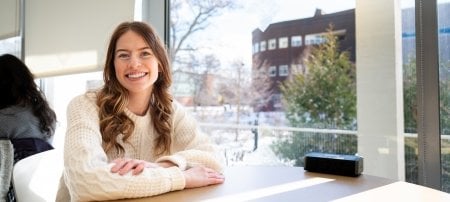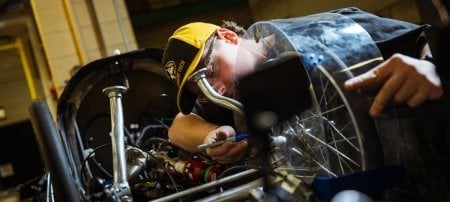It was Michigan Tech's "wonderful reputation" that first got the attention of Audra Morse. That reputation was enough to convince her to leave Texas Tech to lead Michigan Tech's Department of Civil and Environmental Engineering.
On July 1, Audra Morse began her tenure as chair of the Department of Civil and Environmental Engineering at Michigan Technological University. Morse comes to Michigan Tech from Texas Tech, where she had been the associate dean for undergraduate studies for more than 4 years.
Morse earned her bachelor’s, master’s and PhD degrees from Texas Tech and has been on the faculty there since 2003. She is a licensed professional engineer and a board-certified environmental engineer with the American Academy of Environmental Engineers and Scientists. She is a member of several professional organizations, including the American Society of Civil Engineers, the Water Environment Federation, the American Water Works Association, American Society for Engineering Educators and the American Academy of Environmental Engineers and Scientists. However, she is most active with ASCE, serving at both the global and regional levels.
Morse says it was the “wonderful reputation” of Michigan Tech and the CEE Department that got her attention. “I met and worked with CEE alumni through my activities and service with ACSE on the state and global level, and I regard them as leaders in their field.” She says it was the experience working with staff from Tech’s Mechanical Engineering-Engineering Mechanics Department on the Transforming Engineering Culture to Advance Inclusion and Diversity (TECAID) project that allowed her to learn more about University’s culture. “I believe my values as a faculty member are in alignment with what I learned about Michigan Tech, and I could envision being a faculty member there,” she says.
Although she has come from a university with a student population roughly five times that of Michigan Tech, Morse says the similarities between the two schools are striking. “Upon first glance it may seem that the institutions must vary significantly, but the two Colleges of Engineering and the departments are very similar in size. The similar size of students, faculty and staff inspired me to apply to Michigan Tech,” Morse says.
She says that at Michigan Tech, engineering comprises a greater percentage of the overall student population, which is different from her previous experience. “I see this as an opportunity at Michigan Tech that I did not have (at Texas Tech). As such, I believe CEE students and graduates, as well as the CEE faculty and staff, can have a greater impact on the University’s successes as compared to larger institutions.”
Morse says as she prepared for her interview, she reviewed the University’s Strategic Plan, the CEE Department’s mission statement, vision statement and guiding principles. “The themes, ideas and goals present in these documents resonated with me,” she explains. “Additionally, the College of Engineering recently finished the College Strategic Plan, which outlines goals for members of the College to accomplish.” Morse says these documents set a baseline for what she would like the department to accomplish. “However, the true creativity exists in how the department meets the outlined goals.”
"The faculty, staff and students of the CEE have and will continue to accomplish great things ..."
Michigan Tech’s Department of Civil and Environmental Engineering is consistently ranked among the best of the nation. Morse hopes to build on that success.
“I believe the CEE Department has great potential to grow the graduate program while continuing to build industry funding sources, increase diversity of the undergraduate student population and advance the quality of our undergraduate education through more service learning and problem-based learning approaches, while also creating more inclusive classroom environments. The faculty, staff and students of the CEE have and will continue to accomplish great things, and I look forward to making others aware of their successes.”
University Provost and Vice President for Academic Affairs Jacqueline Huntoon says “Michigan Tech is fortunate to be able to attract talented individuals to leadership positions on our campus. Dr. Morse brings a great deal of experience to her new position, and I look forward to working with her in the future.”
Morse succeeds David Hand, who has been the CEE department chair since 2011 and returned to the classroom as of June, 30.
Michigan Technological University is a public research university founded in 1885 in Houghton, Michigan, and is home to more than 7,000 students from 55 countries around the world. Consistently ranked among the best universities in the country for return on investment, Michigan’s flagship technological university offers more than 120 undergraduate and graduate degree programs in science and technology, engineering, computing, forestry, business and economics, health professions, humanities, mathematics, social sciences, and the arts. The rural campus is situated just miles from Lake Superior in Michigan's Upper Peninsula, offering year-round opportunities for outdoor adventure.






Comments